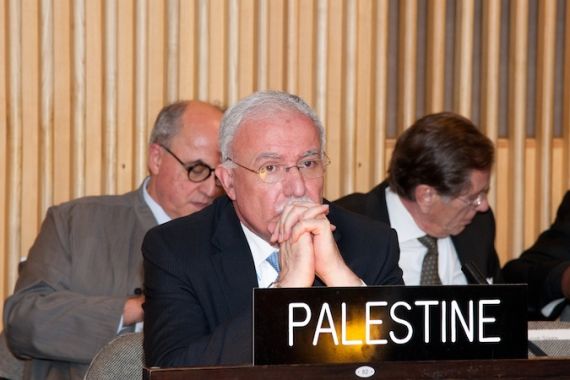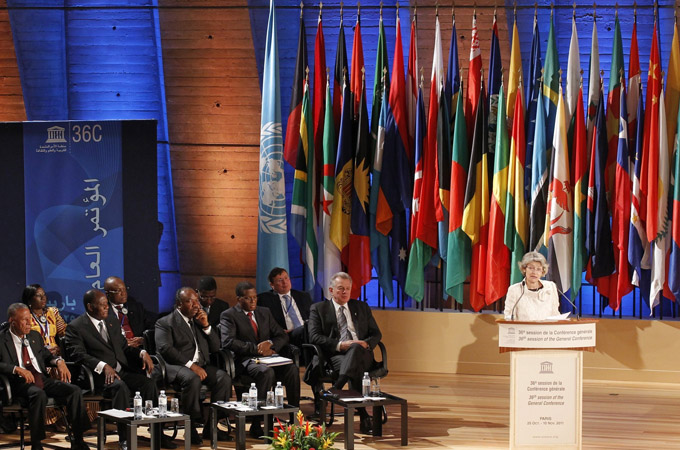PLO to seek membership in more UN agencies
Official says PLO will seek to join more than a dozen world bodies after UNESCO’s vote to admit Palestine.

 UN agencies could potentially lose hundreds of millions of dollars in US funding if they accept Palestine as a full member [EPA]
UN agencies could potentially lose hundreds of millions of dollars in US funding if they accept Palestine as a full member [EPA]Ibrahim Kuraishi, the Palestine Liberation Organisation ambassador in Geneva, has said that the PLO plans to seek membership in more than a dozen UN organisations, among them the World Health Organisation and the International Atomic Energy Agency.
His announcement in the Swiss city came one day after the UN Educational, Scientific and Cultural Organisation, or UNESCO, voted to admit Palestine as a full member.
Kuraishi said on Tuesday the PLO had not yet applied for those additional memberships, but planned to do so over the next few weeks.
“We’re studying and preparing, but we’re taking no action right now,” Kuraishi said. “I think that we’re going to wait for the UN Security Council to vote” on the PLO’s request for full membership at the United Nations.
Mahmoud Abbas, the Palestinian president, submitted that request during the UN General Assembly in September. It has been stalled for weeks in front of the Security Council, and almost certainly faces a US veto when it comes to a vote.
‘Not paying our dues’
If those agencies recognise Palestine, they will also lose US funding, because Washington is barred by law from funding United Nations agencies which fully recognise a Palestinian state.
The prohibition dates back to a 1990 spending bill, which includes the following provision:
“No funds authorized to be appropriated by this Act or any other Act shall be available for the United Nations or any specialized agency thereof which accords the Palestine Liberation Organization the same standing as member states.”
A similar measure, part of a 1994 law, prohibits funding agencies which “grant full membership as a state to any organization or group that does not have the internationally recognised attributes of statehood”.
Many US laws which deal with foreign policy allow the president to override them by issuing a “national security waiver”.
Bill Clinton issued a waiver in 1994, for example, which allowed the PLO to open a mission in Washington in spite of a law prohibiting it. Presidents have re-issued that waiver every six months since.
But the 1990 law does not provide for a waiver, so unless the Obama administration convinces congress to add one [unlikely, given the current makeup of congress], it will have no choice but to cut funding for additional agencies which recognise Palestine.
That could mean hundreds of millions of dollars in cancelled funding: The US is expected to contribute roughly $220mn to the World Health Organisation over the next two years, for example, by far the largest contribution from any country, according to agency budget documents.
That amounts to roughly 23 per cent of the agency’s donations from national governments, though it also receives funding from a variety of other sources.
Fadela Chaib, a spokeswoman for the WHO, acknowledged that a funding cut would hurt the organisation.
“Of course we need it. The US funding is quite important, I guess for all the UN organisations,” Chaib said in Geneva. “It’s a vital funding need for WHO.”
A state department spokesman said in an e-mail that the funding cuts damage US foreign policy, but would not outline any specific steps the Obama administration was taking to avoid further cuts.
“We intend to consult with members of congress to identify how best to move forward,” he said. “As we have said, by not paying our dues to these organisations, we severely reduce our ability to influence their actions and advance US interests and the interests of our allies, including Israel.”
Implications at the ICC?
Kuraishi, the PLO ambasador, said he was bewildered by the hostile reactions from Washington and Jerusalem after the UNESCO vote.
“I don’t know why they’re angry,” he said. “We’re still for negotiations. But with clear parameters.”
One reason the Israeli government is angry, perhaps, is that recognition from UN agencies could have an impact on Palestinian efforts to join the International Criminal Court (ICC). Kuraishi ducked a question on whether that was part of the Palestinian strategy; the PLO has shied away from talking about the court in recent months, for fear of the Israeli reaction.
The PLO is not a member of the Rome Statute, the 1998 treaty which established the world court. But in 2009 it nonetheless asked the court to extend its jurisdiction to the Palestinian territories, invoking a provision of the statute which allows “a state which is not a party” to accept the court’s jurisdiction over particular crimes.
The ICC has yet to decide on that request. That follows a precedent, according to legal scholars: In 1988, for example, the World Health Organisation never responded to a Palestinian request for full recognition.
But now that UNESCO has recognised Palestine – and, certainly, if other UN agencies follow suit – it will become harder for the ICC to avoid the question of Palestinian membership.
“This is a vote by a large number of states that Palestine is a state,” John Quigley, a law professor at Ohio State University, said. “This is a determination by the same states that are members of the UN General Assembly.”
Quigley is one of several legal experts who participated in an ICC-sponsored debate on the Palestinian issue at the Hague last October.
The court did not respond to a request for comment on the UNESCO decision and the status of the Palestinian request.